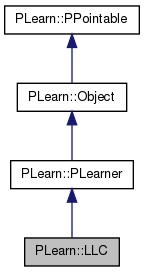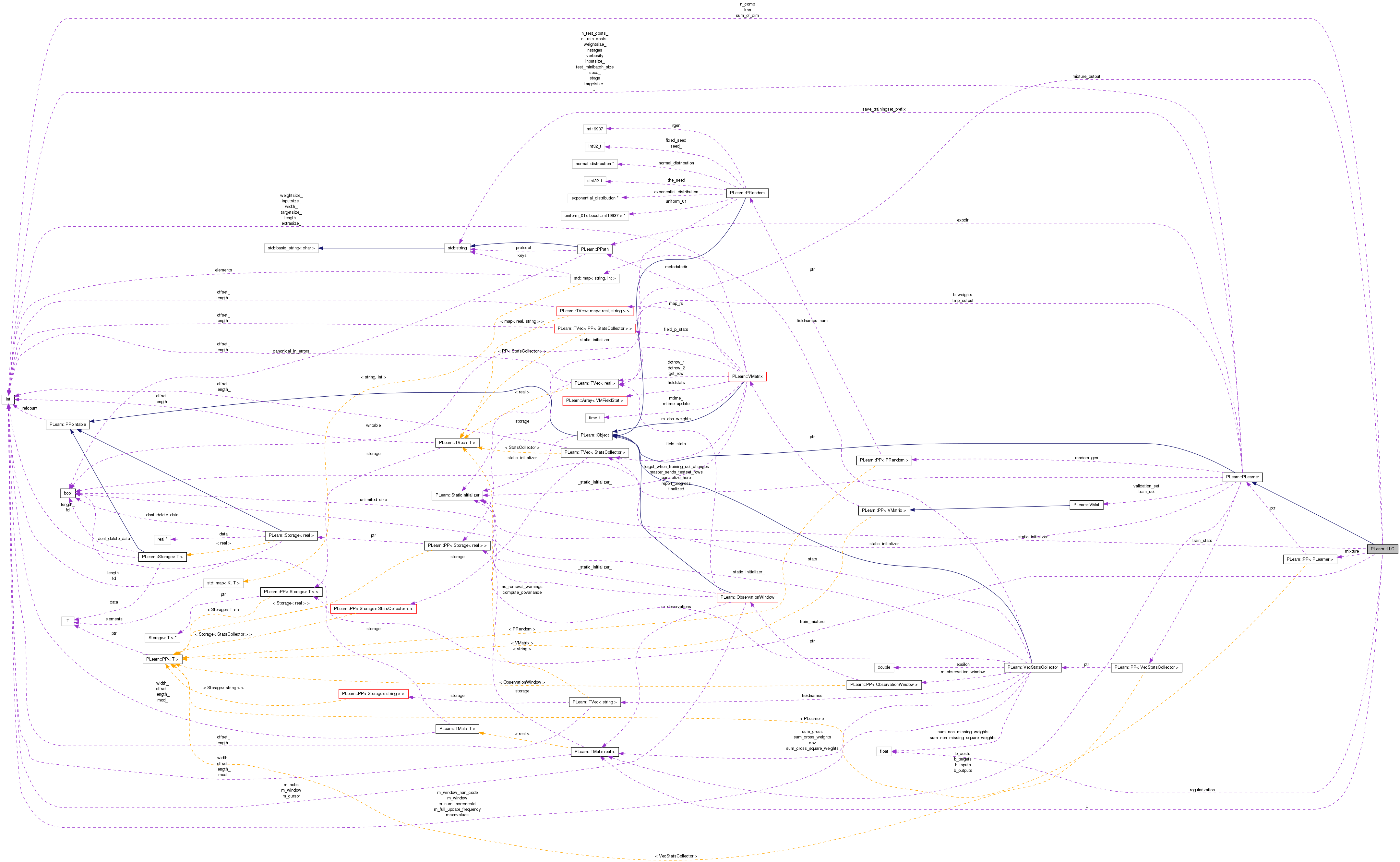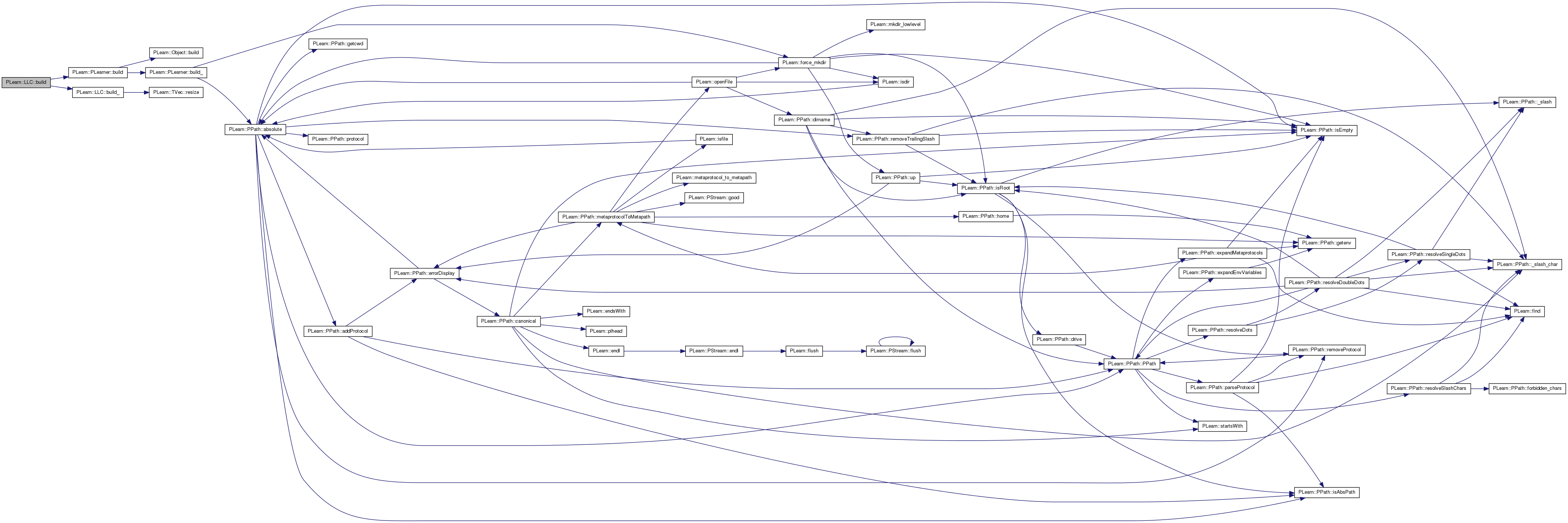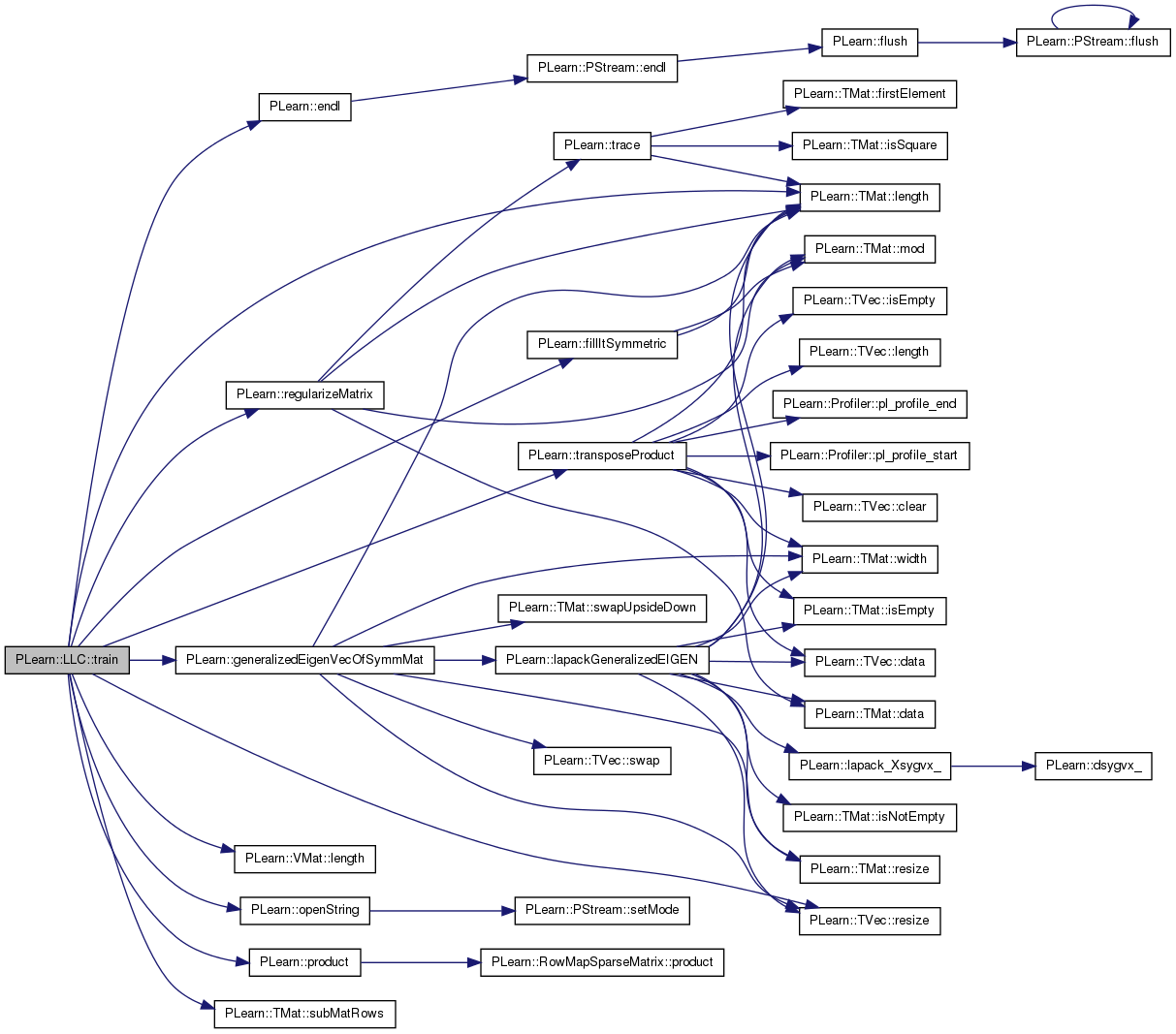|
PLearn 0.1
|
|
PLearn 0.1
|
#include <LLC.h>


Public Member Functions | |
| LLC () | |
| Default constructor. | |
| virtual void | build () |
| Simply calls inherited::build() then build_(). | |
| virtual void | makeDeepCopyFromShallowCopy (CopiesMap &copies) |
| Transforms a shallow copy into a deep copy. | |
| virtual string | classname () const |
| virtual OptionList & | getOptionList () const |
| virtual OptionMap & | getOptionMap () const |
| virtual RemoteMethodMap & | getRemoteMethodMap () const |
| virtual LLC * | deepCopy (CopiesMap &copies) const |
| virtual int | outputsize () const |
| Returns the size of this learner's output, (which typically may depend on its inputsize(), targetsize() and set options). | |
| virtual void | forget () |
| (Re-)initializes the PLearner in its fresh state (that state may depend on the 'seed' option) And sets 'stage' back to 0 (this is the stage of a fresh learner!). | |
| virtual void | train () |
| The role of the train method is to bring the learner up to stage==nstages, updating the train_stats collector with training costs measured on-line in the process. | |
| virtual void | computeOutput (const Vec &input, Vec &output) const |
| Computes the output from the input. | |
| virtual void | computeCostsFromOutputs (const Vec &input, const Vec &output, const Vec &target, Vec &costs) const |
| Computes the costs from already computed output. | |
| virtual TVec< std::string > | getTestCostNames () const |
| Returns the names of the costs computed by computeCostsFromOutpus (and thus the test method). | |
| virtual TVec< std::string > | getTrainCostNames () const |
| Returns the names of the objective costs that the train method computes and for which it updates the VecStatsCollector train_stats. | |
Static Public Member Functions | |
| static string | _classname_ () |
| static OptionList & | _getOptionList_ () |
| static RemoteMethodMap & | _getRemoteMethodMap_ () |
| static Object * | _new_instance_for_typemap_ () |
| static bool | _isa_ (const Object *o) |
| static void | _static_initialize_ () |
| static const PPath & | declaringFile () |
Public Attributes | |
| int | knn |
| PP< PLearner > | mixture |
| int | n_comp |
| real | regularization |
| bool | train_mixture |
Static Public Attributes | |
| static StaticInitializer | _static_initializer_ |
Static Protected Member Functions | |
| static void | declareOptions (OptionList &ol) |
| Declares this class' options. | |
Protected Attributes | |
| Vec | mixture_output |
| Used to store the output of the underlying mixture. | |
| Mat | L |
| int | sum_of_dim |
Private Types | |
| typedef PLearner | inherited |
Private Member Functions | |
| void | build_ () |
| This does the actual building. | |
typedef PLearner PLearn::LLC::inherited [private] |
Reimplemented from PLearn::PLearner.
| PLearn::LLC::LLC | ( | ) |
Default constructor.
Definition at line 55 of file LLC.cc.
: sum_of_dim(-1), knn(5), n_comp(1), regularization(0), train_mixture(true) {}
| string PLearn::LLC::_classname_ | ( | ) | [static] |
Reimplemented from PLearn::PLearner.
| OptionList & PLearn::LLC::_getOptionList_ | ( | ) | [static] |
Reimplemented from PLearn::PLearner.
| RemoteMethodMap & PLearn::LLC::_getRemoteMethodMap_ | ( | ) | [static] |
Reimplemented from PLearn::PLearner.
Reimplemented from PLearn::PLearner.
| Object * PLearn::LLC::_new_instance_for_typemap_ | ( | ) | [static] |
Reimplemented from PLearn::Object.
| StaticInitializer LLC::_static_initializer_ & PLearn::LLC::_static_initialize_ | ( | ) | [static] |
Reimplemented from PLearn::PLearner.
| void PLearn::LLC::build | ( | ) | [virtual] |
Simply calls inherited::build() then build_().
Reimplemented from PLearn::PLearner.
Definition at line 111 of file LLC.cc.
References PLearn::PLearner::build(), and build_().
{
inherited::build();
build_();
}

| void PLearn::LLC::build_ | ( | ) | [private] |
This does the actual building.
Reimplemented from PLearn::PLearner.
Definition at line 120 of file LLC.cc.
References mixture_output, PLearn::TVec< T >::resize(), and sum_of_dim.
Referenced by build().
{
// ### This method should do the real building of the object,
// ### according to set 'options', in *any* situation.
// ### Typical situations include:
// ### - Initial building of an object from a few user-specified options
// ### - Building of a "reloaded" object: i.e. from the complete set of all serialised options.
// ### - Updating or "re-building" of an object after a few "tuning" options have been modified.
// ### You should assume that the parent class' build_() has already been called.
if (sum_of_dim > 0)
mixture_output.resize(sum_of_dim);
}


| string PLearn::LLC::classname | ( | ) | const [virtual] |
Reimplemented from PLearn::Object.
| void PLearn::LLC::computeCostsFromOutputs | ( | const Vec & | input, |
| const Vec & | output, | ||
| const Vec & | target, | ||
| Vec & | costs | ||
| ) | const [virtual] |
Computes the costs from already computed output.
Implements PLearn::PLearner.
Definition at line 136 of file LLC.cc.
{
// No cost to compute.
}
Computes the output from the input.
Reimplemented from PLearn::PLearner.
Definition at line 145 of file LLC.cc.
References L, mixture, mixture_output, n_comp, PLearn::product(), and PLearn::TVec< T >::resize().
{
output.resize(n_comp);
// As in the train method, we assume the mixture has just the nice output
// we need.
mixture->computeOutput(input, mixture_output);
product(output, L, mixture_output);
}

| void PLearn::LLC::declareOptions | ( | OptionList & | ol | ) | [static, protected] |
Declares this class' options.
Reimplemented from PLearn::PLearner.
Definition at line 72 of file LLC.cc.
References PLearn::OptionBase::buildoption, PLearn::declareOption(), PLearn::PLearner::declareOptions(), knn, L, PLearn::OptionBase::learntoption, mixture, n_comp, regularization, sum_of_dim, and train_mixture.
{
// ### For the "flags" of each option, you should typically specify
// ### one of OptionBase::buildoption, OptionBase::learntoption or
// ### OptionBase::tuningoption. Another possible flag to be combined with
// ### is OptionBase::nosave
// Build options.
declareOption(ol, "knn", &LLC::knn, OptionBase::buildoption,
"Number of neighbors used to compute local reconstruction weights.");
declareOption(ol, "mixture", &LLC::mixture, OptionBase::buildoption,
"A mixture of local dimensionality reducers.");
declareOption(ol, "n_comp", &LLC::n_comp, OptionBase::buildoption,
"Number of components computed.");
declareOption(ol, "regularization", &LLC::regularization, OptionBase::buildoption,
"A regularization coefficient (to use if crash in the eigensystem, but assume the consequences).");
declareOption(ol, "train_mixture", &LLC::train_mixture, OptionBase::buildoption,
"Whether the mixture should be trained or not.");
// Learnt options.
declareOption(ol, "L", &LLC::L, OptionBase::learntoption,
"The matrix of factors (bias and linear transformation for each neighborhood).");
declareOption(ol, "sum_of_dim", &LLC::sum_of_dim, OptionBase::learntoption,
"Must be equal to mixture->outputsize().");
// Now call the parent class' declareOptions.
inherited::declareOptions(ol);
}

| static const PPath& PLearn::LLC::declaringFile | ( | ) | [inline, static] |
Reimplemented from PLearn::PLearner.
Reimplemented from PLearn::PLearner.
| void PLearn::LLC::forget | ( | ) | [virtual] |
(Re-)initializes the PLearner in its fresh state (that state may depend on the 'seed' option) And sets 'stage' back to 0 (this is the stage of a fresh learner!).
Reimplemented from PLearn::PLearner.
Definition at line 157 of file LLC.cc.
References L, PLearn::TMat< T >::resize(), PLearn::PLearner::stage, and sum_of_dim.
{
stage = 0;
sum_of_dim = -1;
L.resize(0,0);
}

| OptionList & PLearn::LLC::getOptionList | ( | ) | const [virtual] |
Reimplemented from PLearn::Object.
| OptionMap & PLearn::LLC::getOptionMap | ( | ) | const [virtual] |
Reimplemented from PLearn::Object.
| RemoteMethodMap & PLearn::LLC::getRemoteMethodMap | ( | ) | const [virtual] |
Reimplemented from PLearn::Object.
| TVec< string > PLearn::LLC::getTestCostNames | ( | ) | const [virtual] |
Returns the names of the costs computed by computeCostsFromOutpus (and thus the test method).
Implements PLearn::PLearner.
Definition at line 167 of file LLC.cc.
{
static TVec<string> noCost;
return noCost;
}
| TVec< string > PLearn::LLC::getTrainCostNames | ( | ) | const [virtual] |
Returns the names of the objective costs that the train method computes and for which it updates the VecStatsCollector train_stats.
Implements PLearn::PLearner.
Definition at line 176 of file LLC.cc.
{
static TVec<string> noCost;
return noCost;
}
| void PLearn::LLC::makeDeepCopyFromShallowCopy | ( | CopiesMap & | copies | ) | [virtual] |
Transforms a shallow copy into a deep copy.
Reimplemented from PLearn::PLearner.
Definition at line 185 of file LLC.cc.
References PLearn::PLearner::makeDeepCopyFromShallowCopy(), and PLERROR.
{
inherited::makeDeepCopyFromShallowCopy(copies);
// ### ex:
// deepCopyField(trainvec, copies);
// ### Remove this line when you have fully implemented this method.
PLERROR("LLC::makeDeepCopyFromShallowCopy not fully (correctly) implemented yet!");
}

| int PLearn::LLC::outputsize | ( | ) | const [virtual] |
Returns the size of this learner's output, (which typically may depend on its inputsize(), targetsize() and set options).
Implements PLearn::PLearner.
Definition at line 199 of file LLC.cc.
References n_comp.
{
return n_comp;
}
| void PLearn::LLC::train | ( | ) | [virtual] |
The role of the train method is to bring the learner up to stage==nstages, updating the train_stats collector with training costs measured on-line in the process.
Implements PLearn::PLearner.
Definition at line 207 of file LLC.cc.
References PLearn::endl(), PLearn::fillItSymmetric(), PLearn::generalizedEigenVecOfSymmMat(), i, in, knn, L, PLearn::TMat< T >::length(), PLearn::VMat::length(), mixture, mixture_output, n, n_comp, PLearn::PLearner::nstages, PLearn::openString(), PLASSERT, PLearn::PStream::plearn_ascii, PLWARNING, PLearn::pout, PLearn::product(), regularization, PLearn::regularizeMatrix(), PLearn::TVec< T >::resize(), PLearn::PLearner::stage, PLearn::TMat< T >::subMatRows(), sum_of_dim, train_mixture, PLearn::PLearner::train_set, PLearn::transposeProduct(), and PLearn::PLearner::verbosity.
{
PLASSERT( mixture );
if (stage >= nstages) {
PLWARNING("In LLC::train - Learner has already been trained, skipping training");
return;
}
if (verbosity >= 2)
pout << "Computing local reconstruction weights" << endl;
PP<ReconstructionWeightsKernel> reconstruct = new ReconstructionWeightsKernel();
reconstruct->knn = knn + 1; // +1 because it includes the point itself.
reconstruct->build();
reconstruct->setDataForKernelMatrix(train_set);
int n = train_set->length();
Mat lle_mat(n,n);
reconstruct->computeLLEMatrix(lle_mat); // Fill lle_mat with W + W' - W' W.
for (int i = 0; i < n; i++)
lle_mat(i,i) = lle_mat(i,i) - 1; // lle_mat = - (I - W') * (I - W)
if (train_mixture) {
if (verbosity >= 2)
pout << "Training mixture" << endl;
mixture->setTrainingSet(train_set);
mixture->train();
}
// Obtain the number of components in the mixture (= the number of 'experts').
// We assume here the mixture has a 'n_components' option.
int n_comp_mixture;
string mixture_n_components = mixture->getOption("n_components");
openString(mixture_n_components, PStream::plearn_ascii) >> n_comp_mixture;
// Obtain the dimension of each expert in the mixture.
// We assume here the mixture has a 'outputsizes' option which is a TVec<int>
// containing the outputsize of each expert.
TVec<int> dimension;
string mixture_outputsizes;
PStream in = openString(mixture_outputsizes, PStream::plearn_ascii);
in >> dimension;
sum_of_dim = n_comp_mixture;
for (int k = 0; k < dimension.length(); k++)
sum_of_dim += dimension[k];
mixture_output.resize(sum_of_dim);
// Compute the output of the mixture for all elements in the training set.
// The output must be a vector of size 'sum_of_dim' which is the concatenation
// of the output of each expert in the mixture, each weighted by its
// responsibility r_k (that can depend on x, and such that sum_k r_k = 1),
// and with a bias (= r_k) added as the first dimension of each expert.
if (verbosity >= 2)
pout << "Computing mixture outputs" << endl;
Mat U(n, sum_of_dim);
mixture->useOnTrain(U);
if (verbosity >= 2)
pout << "Building the generalized eigenvector system" << endl;
Mat B(sum_of_dim, sum_of_dim);
transposeProduct(B, U, U);
B /= real(1.0 / n); // B = 1/n U' U
Mat A(sum_of_dim, sum_of_dim);
Mat tmp(n, sum_of_dim);
product(tmp, lle_mat, U);
// A = - U' (I - W') (I - W) U (because we want the smallest eigenvalues).
transposeProduct(A, U, tmp);
tmp = Mat(); // Free memory.
fillItSymmetric(A); // A and B should be already symmetric, but it may be safer
fillItSymmetric(B); // to ensure it.
if (verbosity >= 2)
pout << "Solving the generalized eigensystem" << endl;
Vec eigen_val;
Mat eigen_vec;
if (regularization > 0)
regularizeMatrix(B, regularization);
generalizedEigenVecOfSymmMat(A, B, 1, n_comp + 1, eigen_val, eigen_vec);
// Ignore the smallest eigenvalue (should be 0).
if (verbosity >= 5)
pout << "Smallest eigenvalue: " << eigen_val[0] << endl;
L = eigen_vec.subMatRows(1, eigen_vec.length() - 1);
if (verbosity >= 2)
pout << "Training is over" << endl;
stage = 1;
}

Reimplemented from PLearn::PLearner.
Definition at line 75 of file LLC.h.
Referenced by declareOptions(), and train().
Mat PLearn::LLC::L [protected] |
Definition at line 66 of file LLC.h.
Referenced by computeOutput(), declareOptions(), forget(), and train().
Definition at line 76 of file LLC.h.
Referenced by computeOutput(), declareOptions(), and train().
Vec PLearn::LLC::mixture_output [mutable, protected] |
Used to store the output of the underlying mixture.
Definition at line 60 of file LLC.h.
Referenced by build_(), computeOutput(), and train().
Definition at line 77 of file LLC.h.
Referenced by computeOutput(), declareOptions(), outputsize(), and train().
Definition at line 78 of file LLC.h.
Referenced by declareOptions(), and train().
int PLearn::LLC::sum_of_dim [protected] |
Definition at line 79 of file LLC.h.
Referenced by declareOptions(), and train().
 1.7.4
1.7.4